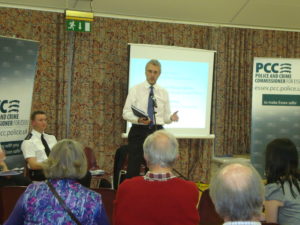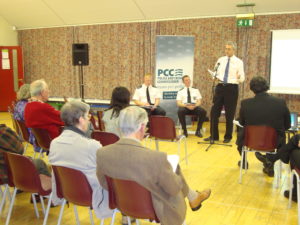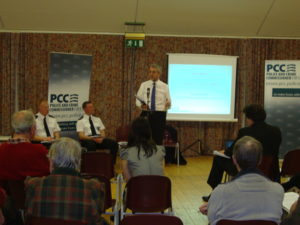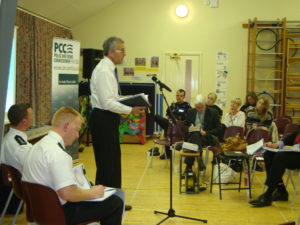The Thaxted Debate
The Police and Crime Commissioner for Essex was in Thaxted on Thursday evening for his 38th public meeting since he was elected, addressing questions from the public and bringing Uttlesford’s communities together with their local policing leaders to discuss the latest crime and safety issues.
The meeting, held in Thaxted primary school on April 24, was well attended by people from across the district, who participated in a lively debate with District Commander Richard Melton, Inspector Colin Cox, Sgt Stewart Eastbrook and local Thaxted officer Pc Hannah Griffiths. Chief Superintendent Carl O’Malley, policing Commander for the North of Essex was in the audience to provide a strategic perspective on policing in the county, and members of the local Community Safety Partnership provided an insight into the collaborative working between statuary and voluntary sector partners which plays such a critical part in local problem solving.
Chief Inspector Richard Melton provided an overview of crime in the local area, which overall has increased by around 2.2% in the last year compared to the previous 12 month period. A detailed briefing note with context can be read here.
The District Commander was keen to reiterate that Uttlesford remains an extremely safe area, with only 34.5 crimes per 1000 people in Uttlesford – almost the lowest of all the districts in Essex. Crime Prevention Officer for the district, Peter Caulfield reflected that when he began working for Essex Police nearly 20 years ago, there were around 33 crimes per 1000 people. Peter felt the fact that this figure remains so similar today was both encouraging and a testament to the work of police, partners and everyone in the local community to keep the district safe.
The PCC was keen to explore the details of some of the crime trends in Uttlesford. Chief Insp Melton outlined the reasons for the increase in house burglary of just over 50 per cent, and spoke about how passionately his officers feel about solving this particularly intrusive and upsetting crime type. He detailed the targeted work that both detectives and neighbourhood officers have undertaken in recent months to tackle house burglary, which has resulted in the arrest of 10 suspects, including one individual admitted 13 counts of burglary and one count of theft of a car and has been sentenced to 7 years in prison.
Both Chief Insp Melton and Insp Cox spoke of the unique challenge that house burglary, and other types of burglary (such as from sheds or garages) presents for investigators. The vast majority of criminals who commit burglary come from outside the district, travelling in and out using the fast road network, and operating across county boundaries. 
To combat this type of criminality, the road network is regularly monitored and Insp Cox works closely with police colleagues in the police forces of Cambridge, Hertfordshire and Suffolk, sharing intelligence and ensuring that offenders have nowhere to hide. As a result of this collaboration, a further two suspects who were originally from Romania were arrested, and found responsible for a large number of offences in Uttlesford over the Christmas period. Following the arrests police were able to return over 100 items of valuable property stolen in burglaries to their rightful owners.
Some members of the audience had questions about the force’s new predictive policing operation –where hotspot burglary areas are identified and proactive crime prevention advice is given to residents, advising them to report any suspicious activity. Although the initiative is still in its infancy, there has been a significant decrease in burglary across the county since its launch, and further research is underway with the University of Essex as to how predictive policing techniques can most effectively be used in a rural setting such as Uttlesford, as well as primarily urban areas. One member of the public, whose neighbour had been a victim of burglary, spoke of her disappointment that, following a burglary near her home, she had not received the crime prevention advice and information as part of this operation, although her neighbours had. Insp Cox committed to ensuring that this was fed back into the continual quality service review that his teams undergo.
Crime Prevention Officer Peter Caulfield, who provides specialist crime prevention advice to the Uttlesford and Braintree districts offered some of top crime prevention tips for protecting sheds and garages. Chief Insp Melton reiterated the fact that like most crime – burglary is almost impossible to tackle and solve without the help of the public, and strongly encouraged people to call 999 if they see anything suspicious or which causes them concern.
The PCC had specifically decided that the troubling issue of financial fraud against vulnerable and elderly victims should be discussed and publicised at the meeting. This has been an increasing issue across Essex, and in some cases perpetrators have posed as Metropolitan Police officers calling vulnerable and isolated residents to falsely warn them of bank account fraud, gaining their trust and tricking them into handing over large amounts of money or credit cards. Chief Insp Melton spoke of his disgust at these crimes in which some of the most vulnerable members of our communities are targeted, and insisted there was ‘no shame’ in being tricked by these scams as the perpetrators are extremely convincing – especially when people are posing as the social figures we should be able to trust most. A member of neighbourhood watch confirmed that advice regarding this kind of fraud has been circulated in the neighbourhood watch magazine, and the clear message from Essex Police is that people should never give bank details to anyone who calls you.
A number of Uttlesford residents expressed their frustration at the continuing tradition of hare-coursing which takes place primarily in the rural countryside of the north of Essex. Insp Cox told residents that a dedicated team of special constables has recently been created and specifically trained in identifying and investigating rural crime – including hare coursing – and are now deployed out of Great Dunmow police station. The Rural Specials team has access to a 4×4 vehicle allowing them to better tackle the terrain in rural Essex. The aim is that this will help to achieve a significant impact in tackling hare-coursing and other types of rural crime in Uttlesford and the north of the county.
Reckless driving was also an issue of concern for many residents, with one member of the audience giving an example of being dangerously tail-gated on the way to attend the meeting that very evening. Nick Alston agreed that more needs to be done with partners to improve the awareness of new drivers, and Chief Insp Melton gave details of a scheme under which any driver questioned by police over a first time, low-level offence – such as use of mobile phone or lack of seatbelt – would be automatically offered a driver improvement course. The PCC confirmed that there was a good uptake of this opportunity by those offered it, and one audience member added that a daughter of a friend had themselves attended a course and found it extremely beneficial.
Once again the issue of the Essex Police property estate and closure of police stations was discussed. In response to a question from the audience, Chief Insp Melton explained in addition to officers working from Great Dunmow police station, the site is now the business centre for Essex Police, housing the finance, HR and also Scenes of Crime Officer teams. The old Great Dunmow police station has recently been sold to community safety partners, and the former Thaxted police station now houses specialist interview suites for vulnerable victims. It is likely that it eventually will be either sold to generate capital for reinvestment in policing, or released into community use. Nick Alston confirmed that this was an ongoing debate, and welcomed ideas and feedback from the community on these challenging decisions.
After a productive two hours, Nick Alston closed the meeting by thanking the audience for attending, and encouraging ongoing dialogue between the public and the police to ensure that not only crime, but failures In police service are reported, to help make Essex and its policing service the safest and best it can possibly be. The meeting closed at approximately 9pm, after which attendees stayed to talk to the PCC and police officers.










